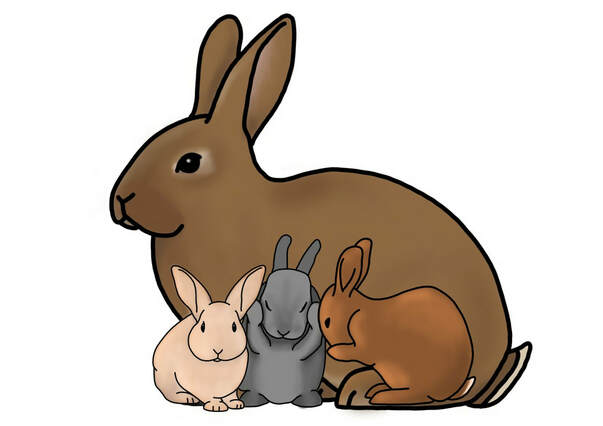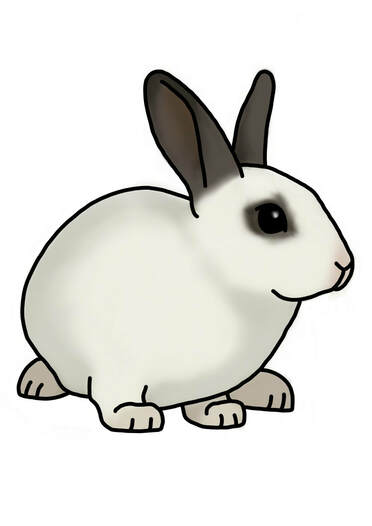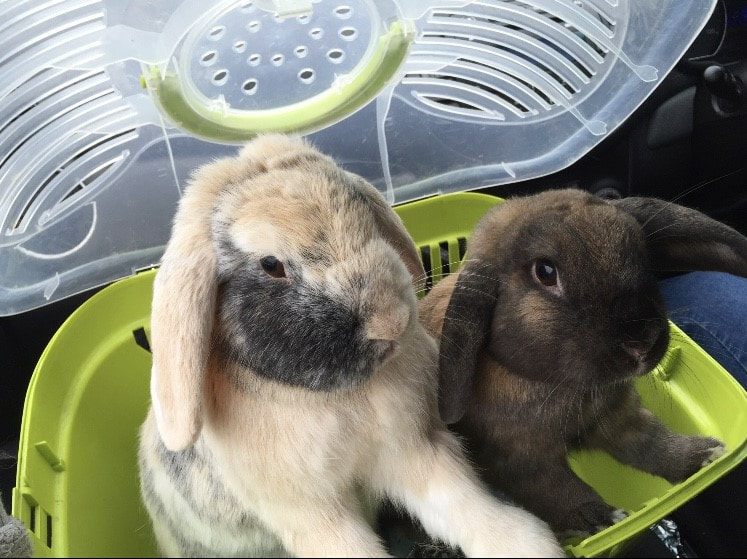What does neutering mean?
To neuter means to remove an animals reproductive system. When neutering a female it is referred to as a spay. When neutering a male it is referred to as castration.
Why it is important... the facts!
We believe it is very important to neuter all domestic rabbits due to the overwhelming numbers that find themselves without a home.
-Over 67,000 rabbits enter rescue centres yearly and these are the lucky ones.
-The saying 'breed like rabbits' is very much a reality and a female rabbit can have a litter every 30 days of up to 16 in each litter!
-Males can be sexually mature from 8 weeks old, I've personally seen a male with testicles at 6 weeks!
-Females can be sexually mature from 16 weeks old.
-Rabbits will breed with family members, just because they are brother and sister, mother and son etc, don't think they won't breed!
-A female rabbit can become impregnated instantly after giving birth if the male is still in with her.
-Females have an 80% chance of developing uterine cancer once they reach the age of 4 if unspayed.
-Males can also be at risk of cancers due to surging hormones.
-Both male and female rabbits can grow increasingly aggressive at sexual maturity due to their hormones.
-Unneutered males will spray urine which causes odour and stains, this could attract flies. Females have been known to spray too.
-Over 67,000 rabbits enter rescue centres yearly and these are the lucky ones.
-The saying 'breed like rabbits' is very much a reality and a female rabbit can have a litter every 30 days of up to 16 in each litter!
-Males can be sexually mature from 8 weeks old, I've personally seen a male with testicles at 6 weeks!
-Females can be sexually mature from 16 weeks old.
-Rabbits will breed with family members, just because they are brother and sister, mother and son etc, don't think they won't breed!
-A female rabbit can become impregnated instantly after giving birth if the male is still in with her.
-Females have an 80% chance of developing uterine cancer once they reach the age of 4 if unspayed.
-Males can also be at risk of cancers due to surging hormones.
-Both male and female rabbits can grow increasingly aggressive at sexual maturity due to their hormones.
-Unneutered males will spray urine which causes odour and stains, this could attract flies. Females have been known to spray too.
How to find a rabbit savvy vet...- Check out the RWAF rabbit savvy vet list!
rabbitwelfare.co.uk/rabbit-care-advice/rabbit-friendly-vets/rabbit-friendly-vet-list/ - Ring your chosen practice and enquire who their exotic trained or rabbit savvy vets are, when they are available and what emergency hospital they are linked to (if not on site). |
- Arrange an appointment with your chosen vet; remember to ask for your rabbit savvy vet every time you book an appointment.
- Write down questions you want to ask your vet prior to meeting them. Don't be afraid to question your vet on their experience. Any good vet will be happy to answer your questions.
- Research recommendations and reviews.
- You should feel happy, confident, relaxed and in control around your vet.
- Write down questions you want to ask your vet prior to meeting them. Don't be afraid to question your vet on their experience. Any good vet will be happy to answer your questions.
- Research recommendations and reviews.
- You should feel happy, confident, relaxed and in control around your vet.
Questions to ask your rabbit savvy vet
|
-What qualifications do you hold? Are you qualified in exotics? (Rabbits come under an exotic pet).
-Does your practice hold a gold or silver rwaf standard? (Some vets may not have this if they haven't applied). -What are your main interests surrounding rabbit care? -How many rabbits do you see per week/month? -How many neuters do you carry out per week/month? -How have you improved your rabbit protocols in the last year? -Do your vets know about RHD2, the vaccines available and how long they last? -Do they have experience in dentals and/or other difficult ops? -How would you hold a rabbit to check teeth, clip nails etc. They should never hold a rabbit on its back or be scruffed. |
How to prepare prior to neuter
- Ensure you have all their absolute favorite foods in stock, it is very important that rabbits start eating and drinking within a few hours after the op so be sure to offer them a variety of foods to get them eating.
- It's important to feed your rabbit right up until you take them into the vets for their operations, unlike cats and dogs you DO NOT have to starve them before anesthetic as they cannot be sick. We advise taking in a small packed lunch for your rabbit with a mixture of their pellets and favorite treats such as herbs/banana etc. They need to have familiar foods to encourage them to eat and keep their gut going. These foods will help them feel at home while they are coming around from the anaesthetic.
-Rabbits DO NOT need to be separated from their friend if they are already bonded. If both rabbits need to be neutered they should be booked in on the same day and go in together. If only one rabbit is being neutered (the other already neutered) they can go along for the ride. They can support their friend and help encourage them to move around and eat after op. It's important they maintain their bond and it could be affected if they are separated. Rabbit savvy vets will understand this.
-Once you have dropped them off to the vets, ensure you have a suitable area ready for them to come home to. They will need a slightly smaller area with no levels so they cannot run/jump too much and rip their wounds open. They will need bowls of water and easily accessible food and hay. This area will need to be relatively warm and cosy. You may be able to create this within their normal living arrangements or you may have to move them into a different space for a few days. This space should be kept clean to keep wounds free of infection.
-Keep them warm as they cannot retain their temperature due to anaesthetic.
- It's important to feed your rabbit right up until you take them into the vets for their operations, unlike cats and dogs you DO NOT have to starve them before anesthetic as they cannot be sick. We advise taking in a small packed lunch for your rabbit with a mixture of their pellets and favorite treats such as herbs/banana etc. They need to have familiar foods to encourage them to eat and keep their gut going. These foods will help them feel at home while they are coming around from the anaesthetic.
-Rabbits DO NOT need to be separated from their friend if they are already bonded. If both rabbits need to be neutered they should be booked in on the same day and go in together. If only one rabbit is being neutered (the other already neutered) they can go along for the ride. They can support their friend and help encourage them to move around and eat after op. It's important they maintain their bond and it could be affected if they are separated. Rabbit savvy vets will understand this.
-Once you have dropped them off to the vets, ensure you have a suitable area ready for them to come home to. They will need a slightly smaller area with no levels so they cannot run/jump too much and rip their wounds open. They will need bowls of water and easily accessible food and hay. This area will need to be relatively warm and cosy. You may be able to create this within their normal living arrangements or you may have to move them into a different space for a few days. This space should be kept clean to keep wounds free of infection.
-Keep them warm as they cannot retain their temperature due to anaesthetic.
Post-neutering care
-Settle them into the space provided with fresh and dry food/hay and leave them in a quiet/non busy area for a few hours as they will still be recovering from the anaesthetic.
-The most important thing is that rabbits eat and drink as soon as possible after surgery. Check on them regularly. It can also be helpful to count out the amount of pellets given to monitor if and how many they eat.
-Males often recover much quicker than females, and so females may be more reluctant to move around. Encourage your rabbits to move around to stimulate gut movement.
-Pain relief needs to be administered as prescribed, you should be provided with 2/3 days of pain relief by your vet.
-Watch closely for signs of discomfort or pain, if you feel your rabbit is in pain call your vet as they may need more pain relief or gut stimulants/recovery food.
-Check the wound daily for signs of infection, the wound should be dry and flat.
-Once your rabbit is eating normally again and the wound is healed if you are planning to bond them, you will need to wait 6-8 weeks for hormones to settle.
-Your female rabbit will be shaved on her stomach, don't be alarmed if this doesn't grow back straight away.
-Most stitches used now are dissolvable and some use glue but always check with your vet.
-You will often have to attend one or two post op checks at your vets.



